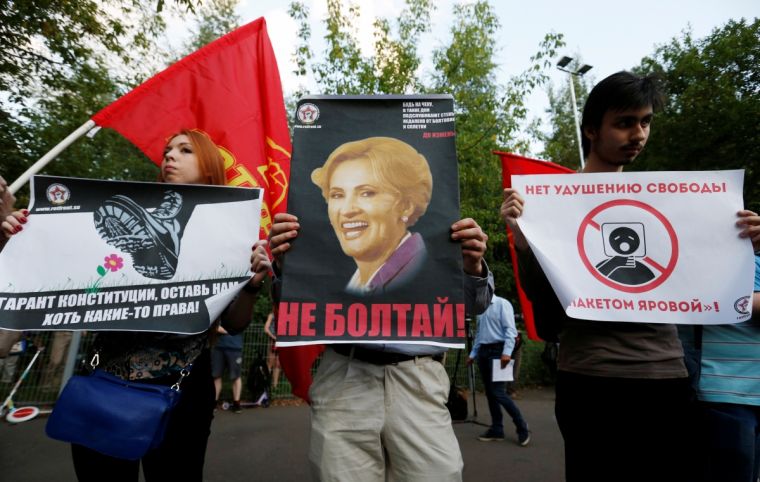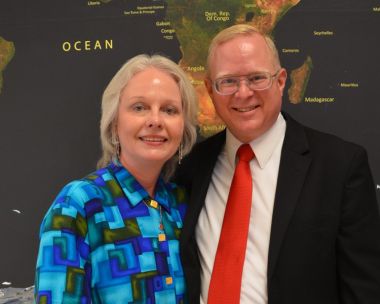Fined for evangelism: How US missionary Don Ossewaarde is challenging Putin's regime

Russia's so-called Yarovaya Law was signed by President Vladimir Putin on July 7. Named after one of its creators, Irina Yarovaya, it's a sweeping expansion of anti-terror and public safety measures. Among its provisions are a draconian clampdown on evangelism and missionary activity.
The law has drawn domestic and world-wide protests, so far without results. One of its first victims was US citizen Don Ossewaarde, who has lived in the town of Oryol for 14 years. He and his wife Ruth are independent missionaries not affiliated to an organisation, a fact crucial to his defence when he was accused of proselytism and fined 40,000 roubles (around $700). While the Ossewaardes have decided to bring their ministry to a close because of the case, Don has remained in Oryol to fight an appeal.
His account of yesterday's hearing paints a picture of a law that's barely even understood by Russia's police and judiciary. The judge was nervous and postponed the hearing to reconvene with (unnecessary) witnesses –Ossewaarde's lawyer is convinced she needed to consult with higher authorities. The presence of representatives from the US State Department, who told him they were interested in his case because it would have "a great influence on the future of religious freedom in Russia", might have had an effect on her composure.
The police captain's presentation, says Ossewaarde, was "unprofessional and unconvincing, but of course I am biased a little bit". He was adamant Ossewaarde had broken the law against proselytising for a missionary organisation, even though he doesn't work for a missionary organisation but just holds Bible studies in his home.
But what's behind the Yarovaya law, and what effect is it going to have on evangelism in Russia?
Ossewaarde told Christian Today: "Even though the new law is poorly drafted and should prove to be largely ineffective, it is my opinion that this law reveals a clear intention by the authorities in Russia to eliminate foreign religious activity. The state and the Orthodox Church work hand in hand to keep the people under the 'patriotic control' of the ruling party.
"President Putin has talked in the past about his plan of "managed democracy". In other words, let the people have freedom, but guide them to make the 'correct' free choices. My case in particular is a test of whether such a blatantly unconstitutional law can stand up to a challenge in court."

He's convinced that in spite of the overt intention of the law, to combat Islamist extremism, those who wrote the anti missionary part of the law were clearly targeting non-orthodox evangelicals. "The Orthodox Church seems to be supportive of the law, as it serves their purpose to keep a religious monopoly," he says.
The Ossewaardes are deeply saddened at the end of their ministry in Oryol. "We have been involved in ministry to the former Soviet Union since my first evangelistic trip to Belarus in 1994," Ossewaarde says. "It has been the central motivating purpose of our lives for almost 22 years. We have lived in this same city for 14 of those years, so our roots are quite deep, and of course we dearly love the people who have come to Christ here."
During those years they've seen the religious climate in Russia change.
"In the early 1990s, Russians were very enthusiastic about the new freedom to finally learn about God and the Bible. I vividly remember visits to Belarus in 1994 and 1995, when we literally distributed truckloads of Bibles on the streets," he says. "People mobbed us with outstretched arms, pleading for a copy of God's Word."
Later, enthusiasm cooled as consumerism began to make an impact. During most of their 14 years of ministry in Oryol, people would accept an offered gospel tract or a New Testament "politely, but more or less indifferently". However, he says: "In the last two years of international conflict between Russia and the West, it has been more common to have our literature rejected when offered." In some smaller towns there has been anti-Western hostility toward missionaries, though they haven't experienced much themselves.
It seems Ossewaarde – and evangelicals generally in Russia – are experiencing the fallout from wider geopolitical tensions. An authoritarian regime determined to brook no dissent, renewed confrontation with the West, fear of internal terror and an Orthodox Church intent on asserting its spiritual authority – all of these factors have converged on a courtroom in a small provincial town. On September 30 – the date of the next hearing – Ossewaarde, and all of Russia's evangelicals, will find out exactly how the state intends to use the Yarovaya Law. If he loses, so will religious freedom in Russia.
Follow Mark Woods on Twitter: @RevMarkWoods











